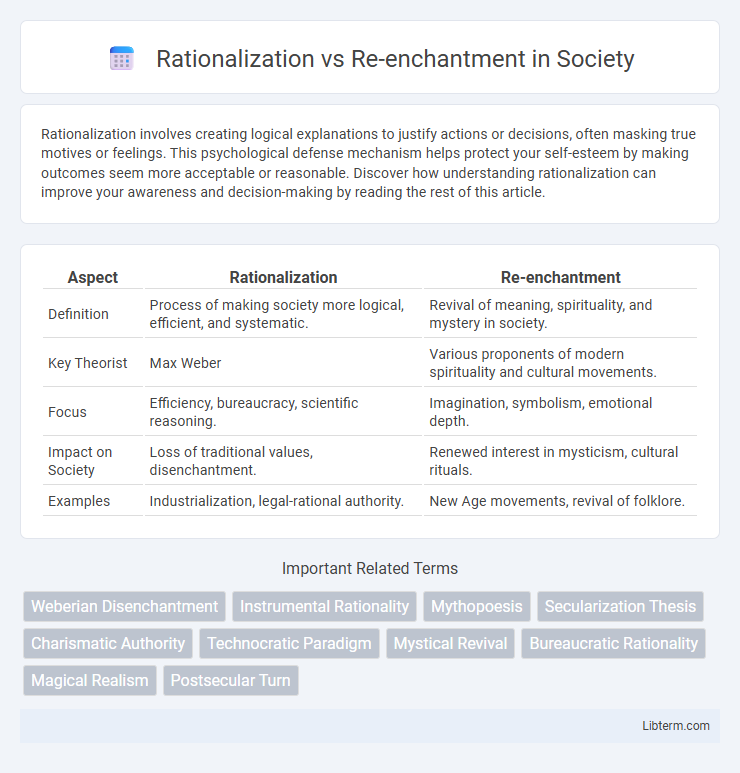Rationalization involves creating logical explanations to justify actions or decisions, often masking true motives or feelings. This psychological defense mechanism helps protect your self-esteem by making outcomes seem more acceptable or reasonable. Discover how understanding rationalization can improve your awareness and decision-making by reading the rest of this article.
Table of Comparison
| Aspect | Rationalization | Re-enchantment |
|---|---|---|
| Definition | Process of making society more logical, efficient, and systematic. | Revival of meaning, spirituality, and mystery in society. |
| Key Theorist | Max Weber | Various proponents of modern spirituality and cultural movements. |
| Focus | Efficiency, bureaucracy, scientific reasoning. | Imagination, symbolism, emotional depth. |
| Impact on Society | Loss of traditional values, disenchantment. | Renewed interest in mysticism, cultural rituals. |
| Examples | Industrialization, legal-rational authority. | New Age movements, revival of folklore. |
Understanding Rationalization: Definition and Origins
Rationalization refers to the process of organizing thoughts, actions, and social structures based on reason, logic, and efficiency, often linked to the works of sociologist Max Weber in the early 20th century. Originating from the Enlightenment era's emphasis on scientific reasoning, rationalization transformed various aspects of society by promoting systematic control and predictability over traditional and mystical explanations. This concept critically shaped modern bureaucracies, capitalism, and technological advancements by prioritizing calculability and formal rules.
The Concept of Re-enchantment Explained
Re-enchantment challenges the modern worldview characterized by rationalization, which emphasizes logic, efficiency, and scientific understanding, by reintroducing meaning, wonder, and spiritual depth into everyday life. This concept promotes a resurgence of awe, mystery, and symbolic significance in a world often perceived as overly mechanized and disenchanting. Through practices like art, religion, and mythology, re-enchantment seeks to restore a holistic and emotionally rich experience that counters the fragmentation caused by dominant rationalist paradigms.
Historical Context: From Enchantment to Rationalization
The historical shift from enchantment to rationalization marks a transition from a worldview steeped in magical and religious interpretations to one dominated by logic, science, and bureaucratic organization. Max Weber identified this evolution as the "disenchantment of the world," where traditional beliefs and mystical understandings are replaced by rational thought governing social institutions. This transformation reshaped societies by prioritizing efficiency, predictability, and calculability over mystical and symbolic meanings.
Key Differences Between Rationalization and Re-enchantment
Rationalization emphasizes logic, efficiency, and predictability by organizing society through rules, regulations, and scientific principles. Re-enchantment restores a sense of wonder, meaning, and spirituality by embracing mystery, creativity, and emotional connection within cultural and social experiences. The key difference lies in rationalization's focus on systematic control versus re-enchantment's pursuit of renewed meaning and transcendence.
The Role of Science and Technology in Rationalization
Science and technology drive rationalization by promoting systematic knowledge and efficiency through empirical methods and technological innovation. Rationalization emphasizes predictability, control, and bureaucratic organization, often reducing complexity to quantifiable data and standardized procedures. This contrasts with re-enchantment, which values subjective meaning, spirituality, and symbolic experiences beyond scientific explanation.
Impact of Rationalization on Culture and Society
Rationalization, characterized by efficiency, predictability, and control, profoundly transforms culture and society by promoting mechanization and bureaucratic structures that often diminish traditional values and emotional connections. This process can lead to a disenchantment of the world, where cultural expressions and social interactions become increasingly standardized and depersonalized. As a result, the impact of rationalization challenges the richness of human experience by reducing symbolic meaning and fostering alienation in modern societies.
Modern Movements Toward Re-enchantment
Modern movements toward re-enchantment challenge the rationalization of society by emphasizing spirituality, mysticism, and a return to nature as sources of meaning and identity. These movements often incorporate practices such as meditation, eco-spirituality, and ritualistic ceremonies to counteract the disenchantment wrought by scientific rationalism. The rise of new religious movements, eco-centric philosophies, and holistic wellness trends illustrates a cultural shift seeking depth and connection beyond purely rational frameworks.
Rationalization vs. Re-enchantment in Everyday Life
Rationalization in everyday life emphasizes efficiency, predictability, and control through systematic processes and logical reasoning, often leading to the depersonalization of social interactions. Re-enchantment counters this by reintroducing meaning, wonder, and emotional depth into mundane experiences, fostering a renewed sense of connection and purpose. Examining these dynamics reveals how individuals balance structured routines with the desire for authenticity and spiritual fulfillment in daily practices.
Benefits and Challenges of Re-enchantment
Re-enchantment fosters creativity, emotional connection, and a renewed sense of meaning in personal and organizational contexts, counteracting the often rigid and dispassionate nature of rationalization. This process can enhance motivation, innovation, and cultural richness but poses challenges such as potential conflicts with efficiency-driven goals and difficulties in maintaining a balance between imaginative freedom and practical constraints. Embracing re-enchantment requires navigating the tension between structured order and visionary flexibility to achieve sustainable growth and human-centered progress.
Future Perspectives: Balancing Rationalization and Re-enchantment
Future perspectives on balancing rationalization and re-enchantment emphasize integrating systematic efficiency with meaningful human experiences to foster sustainable progress. Embracing technological innovation alongside cultural and spiritual renewal creates environments where data-driven decision-making coexists with emotional and ethical engagement. This synthesis supports adaptive societies that value both empirical knowledge and imaginative creativity for holistic development.
Rationalization Infographic

 libterm.com
libterm.com